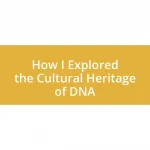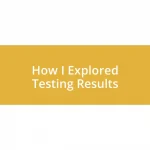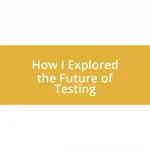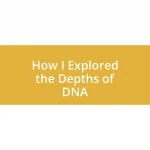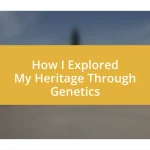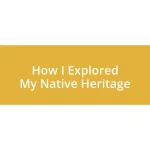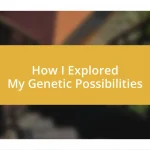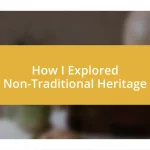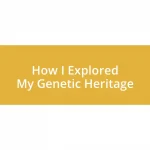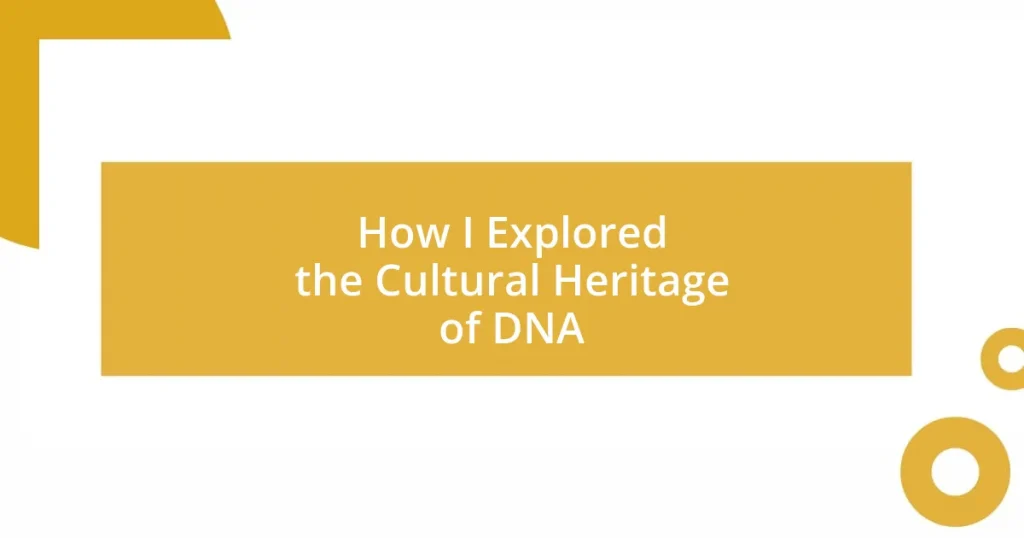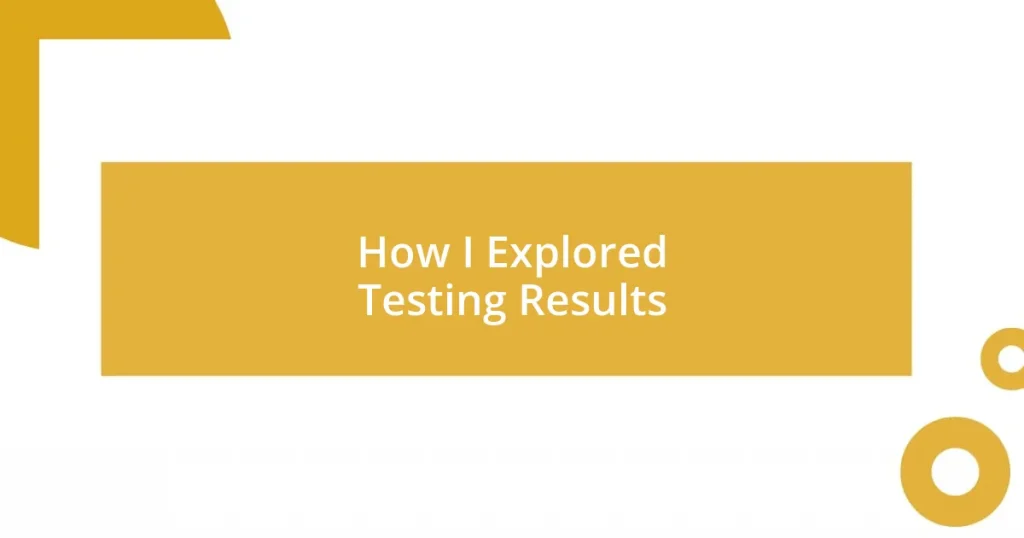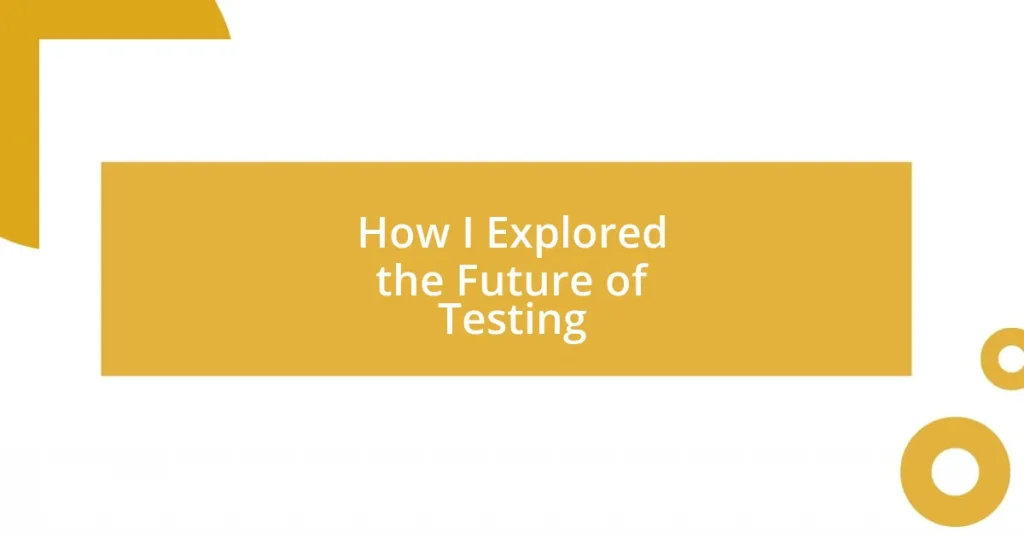Key takeaways:
- DNA serves as a powerful link to our ancestral roots, shaping personal identity and cultural heritage.
- Discoveries through DNA testing can reignite lost traditions and foster a sense of belonging and community.
- Ethical considerations arise around ownership and narrative control of cultural stories tied to DNA.
- Sharing DNA findings encourages communal exploration of heritage, strengthening connections among individuals with shared histories.
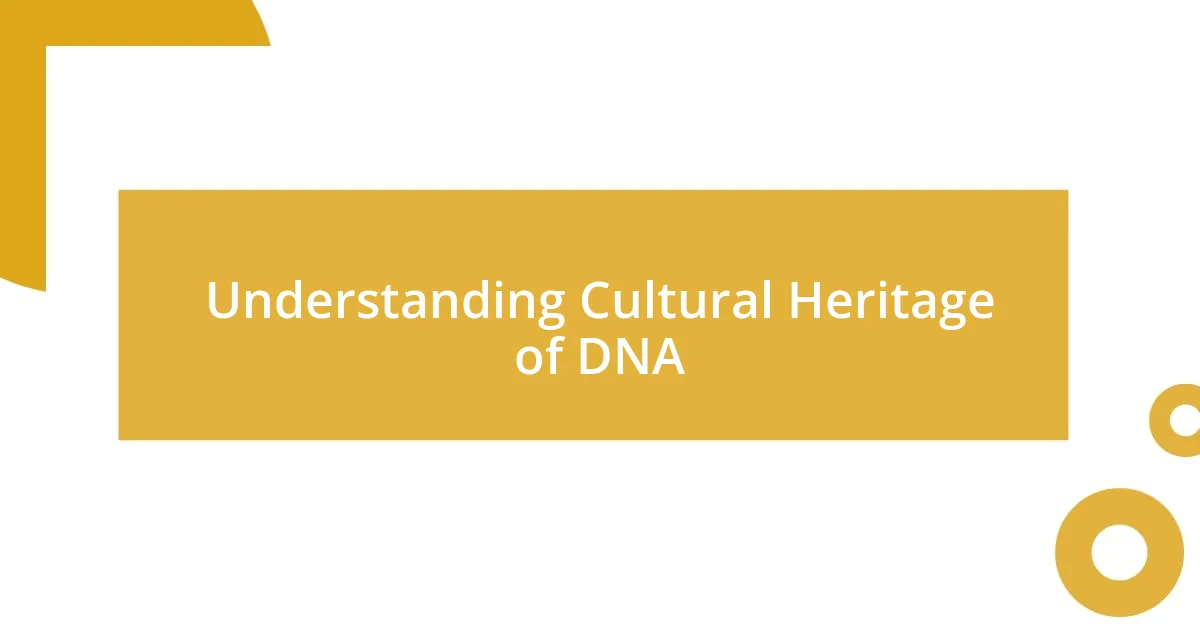
Understanding Cultural Heritage of DNA
Cultural heritage isn’t just what’s passed down through stories or artifacts; it’s deeply embedded in our DNA. I remember one evening while going through my genetic report, seeing how certain markers tied me to specific regions of the world, and it struck me—DNA holds a narrative that connects us to our ancestors. Isn’t it fascinating to think that our biological makeup carries the echoes of our history?
As I delved into various cultures’ significance of ancestry, I found myself pondering how these connections influence our identities today. For instance, a friend of mine found out through a DNA test that she had roots in a culture she had never known. It was a transformative moment for her, sparking a journey of exploration through her newfound heritage, and it brought home to me just how vital this information can be for understanding who we are.
Exploring the cultural heritage of DNA also brings to light the complexities of human experience. I can’t help but think about how, with each new discovery related to my heritage, there’s an emotional component—like unearthing a part of myself. What does that mean for us, as we connect with the histories woven into our very being? Each revelation is not just a fact but a doorway into a rich tapestry of stories waiting to be told.
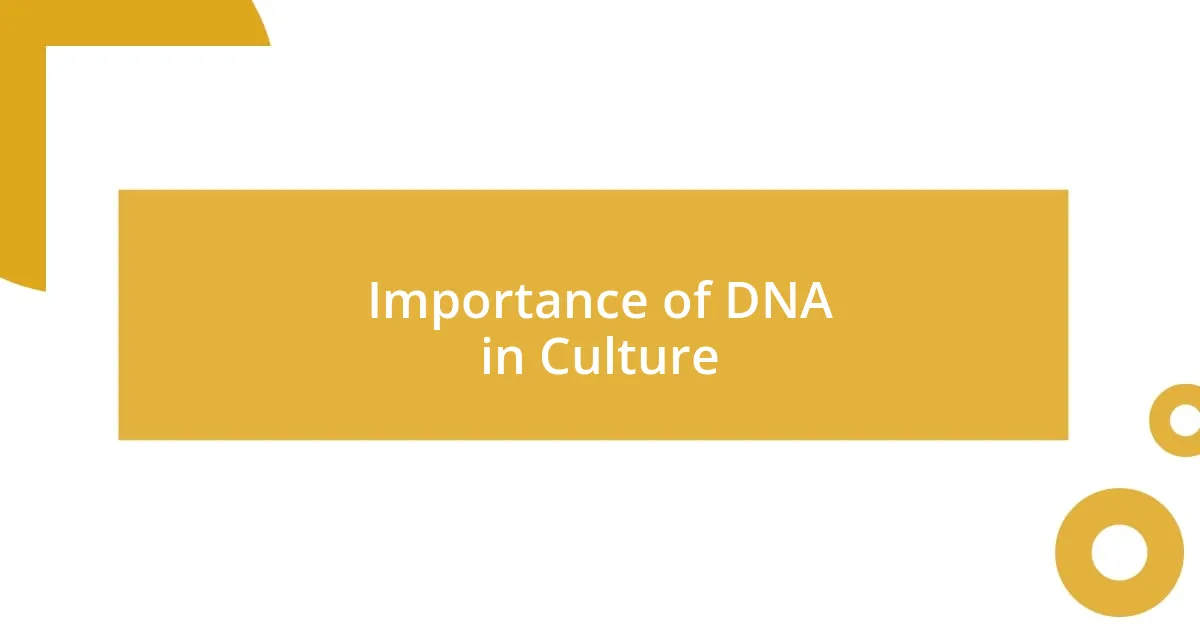
Importance of DNA in Culture
Exploring the importance of DNA in culture illuminates the deeply personal nature of our biological heritage. I recall a moment when I attended a cultural festival celebrating various heritages, and in each dance, song, and food, I could feel how DNA transcended mere science to embody a rich legacy linked to identity. It’s like each person dancing was carrying a piece of their ancestors within them, crafted over generations, showing just how significant our genetic makeup is in shaping cultural expressions.
Moreover, my experience with a community project on heritage led me to realize how many people discover their roots through DNA testing. One woman I met shared how learning about her Native American background prompted her to reconnect with long-lost traditions and rituals. Witnessing her transformation was inspiring—it was a reminder of how our DNA not only connects us to our past but also can empower and enrich our present lives.
Lastly, the dialogue around DNA and culture raises important ethical considerations. As I’ve engaged in discussions about genetic exploration, I’ve often found myself wondering about ownership of this heritage. If our DNA tells a story of who we are, then who gets to narrate that story? It’s a delicate balance between sharing cultural pride and respecting the nuances of each lineage, a challenge that is both fascinating and necessary to consider as we navigate our genetic landscapes.
| Aspect | Significance |
|---|---|
| Identity | DNA connects individuals to their ancestral roots, shaping personal identity. |
| Tradition | Reconnecting with heritage can revive lost traditions through DNA discovery. |
| Ethics | Ownership and narrative control over cultural stories tied to DNA require thoughtful consideration. |
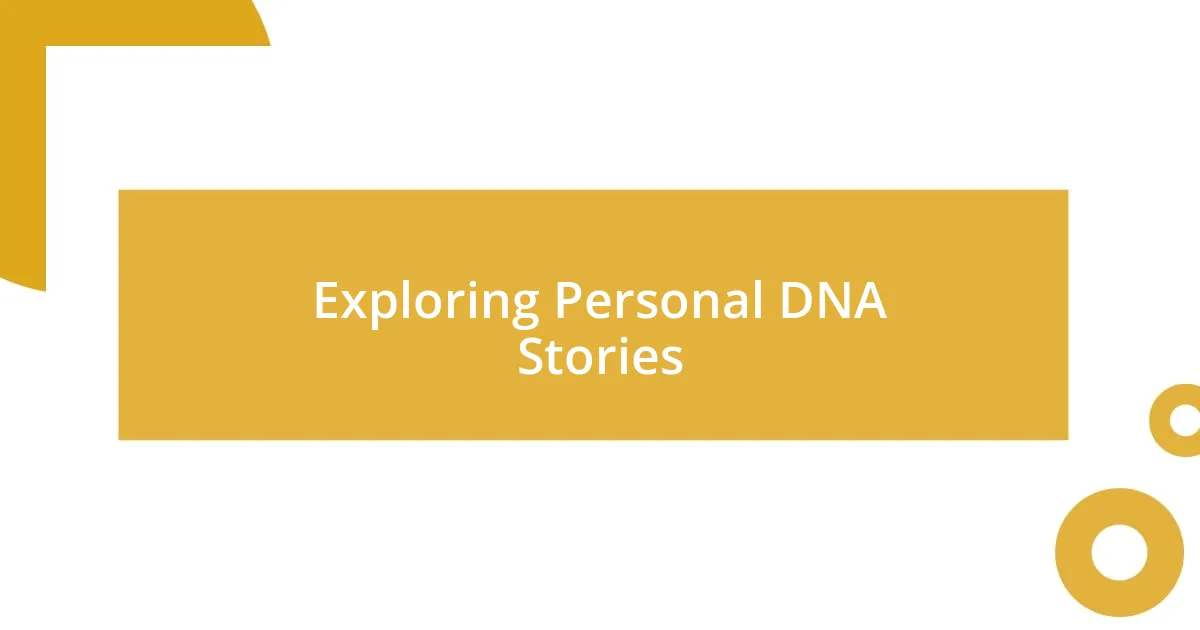
Exploring Personal DNA Stories
Exploring personal DNA stories is a journey that often leads to eye-opening revelations. I remember sharing my genetic results with my family during a holiday gathering. The excitement was palpable as we uncovered ties to a distant European lineage none of us had considered. The laughter around the table felt like a celebration of connection, and it made me realize how our individual stories intertwine to create a broader narrative of who we are.
- I’ve learned that DNA stories can ignite a passion for family history, prompting deep dives into genealogy.
- When I discovered a relative who had emigrated to another continent, it sparked my curiosity to explore their life and choices.
- Numerous conversations with friends revealed similar journeys—the joy of finding a long-lost family member or the thrill of discovering one’s own heritage through travel inspired by genetic results.
Each personal DNA story accentuates the emotional tapestry of our heritage, echoing sentiments that often evoke nostalgia or pride. Just last month, a friend of mine excitedly shared her discovery of African roots through a DNA test. The impact was profound; she felt a pull to learn traditional dances and practices she never knew existed. Witnessing her dance at a community event, I was struck by the joy radiating from her—she had not just found her ancestry, but it was as if she had claimed a piece of herself that had always been missing.
- Discoveries like these can foster a sense of belonging, bridging gaps between past and present.
- Engaging with newly uncovered cultures encourages discussions about identity and history within family settings.
- Embracing our DNA stories often leads to a deeper appreciation of cultural diversity and shared ancestry.
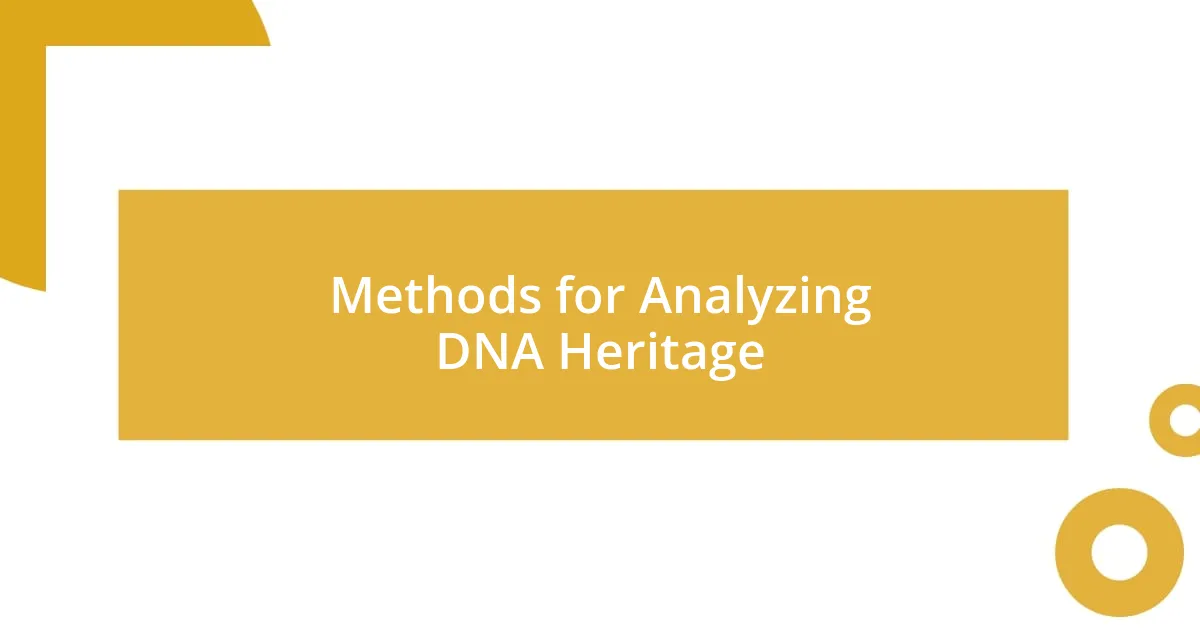
Methods for Analyzing DNA Heritage
When I first delved into DNA heritage analysis, I was amazed by the variety of methods available to interpret my genetic background. One popular approach is the use of autosomal DNA testing, which examines a person’s entire genome. It opened my eyes to connections extending beyond immediate family; I found cousins I hadn’t known existed, and their stories enriched my understanding of our shared lineage. Isn’t it fascinating how something as small as a strand of DNA can weave together so many lives and histories?
Another compelling method involves Y-chromosome and mitochondrial DNA testing. These are particularly interesting because they trace paternal and maternal lines, respectively. I remember the thrill of discovering that my maternal line traced back to a specific region. This wasn’t just information; it ignited a desire in me to explore the cultures that shaped my ancestors’ lives. Have you ever wondered what it would feel like to walk in the footsteps of those who came before you? For me, it was an invitation to honor their journeys.
Lastly, SNP (single nucleotide polymorphism) analysis has become increasingly popular. This method can reveal insights about significant ancestral populations and even geographic regions. I once stumbled upon a detailed report indicating that a significant portion of my ancestry came from the Mediterranean. It was a moment of pure revelation—a connection to a part of the world I’d always felt drawn to but never understood why. Such discoveries encourage a deeper appreciation for the vast tapestry of human heritage, making the question of where we come from feel not just academic but deeply personal. Isn’t that the beauty of exploring our DNA? It opens doors to heritage that might otherwise remain hidden.
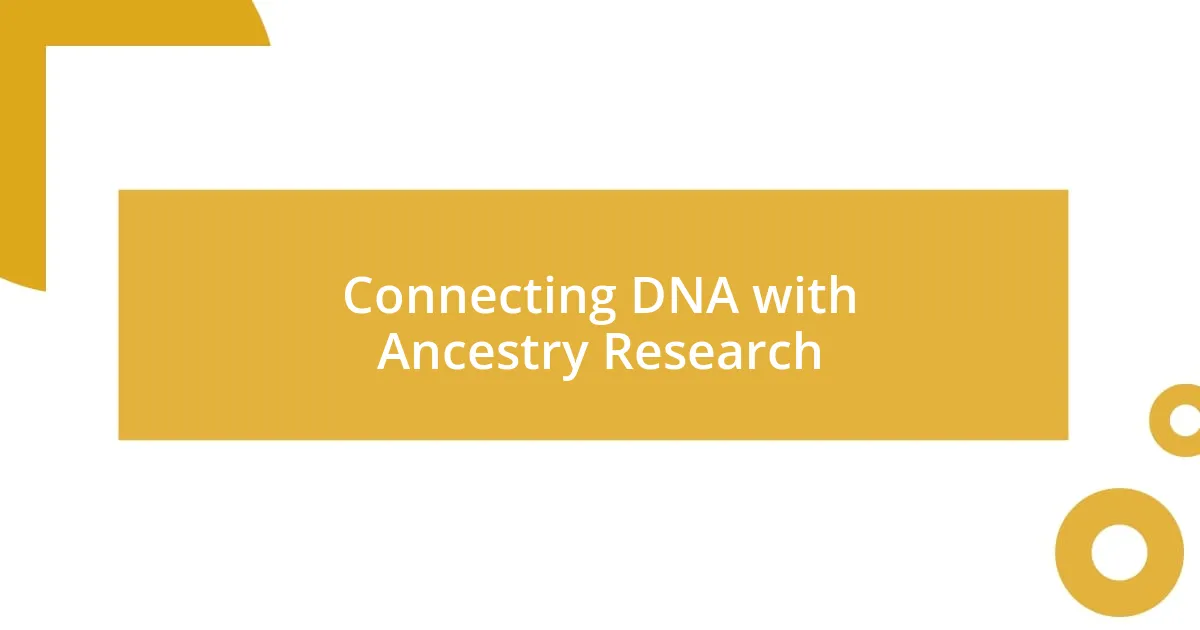
Connecting DNA with Ancestry Research
Connecting DNA with ancestry research has truly transformed the way I view my family history. When I first sent my DNA sample to a commercial testing service, I did it with a sense of curiosity and wonder. What could my genetic makeup reveal about my ancestors? Receiving the results felt like opening a long-lost letter filled with secrets. Among those surprises were connections to places I’d never set foot in but suddenly felt compelled to explore. Has anyone else felt this mix of excitement and longing for a history that feels both foreign and intimately familiar?
I was particularly fascinated when I discovered links to a small village in Spain. This revelation ignited a desire to visit, to walk the streets my ancestors once walked. Standing there, I couldn’t help but imagine the lives they lived, the decisions they made that ultimately led to my existence. It made me wonder: how many of our traits and quirks can be traced back through generations? This experience deepened my appreciation for the interconnectedness of our realities; our DNA holds not just genetic information, but also stories and traditions passed down through time.
As I delved into ancestry research, I also engaged with online communities where others shared their DNA journeys. I remember a moving conversation about how discovering Indigenous roots encouraged one person to reconnect with their community and traditions. It’s incredible how these revelations can foster a sense of responsibility to honor our heritage. In my case, the more I learned, the more I felt compelled to embrace and celebrate the diverse threads that make up my family’s tapestry. Could it be that the pursuit of our ancestors leads us not only to understanding but also to a more enriched sense of self?
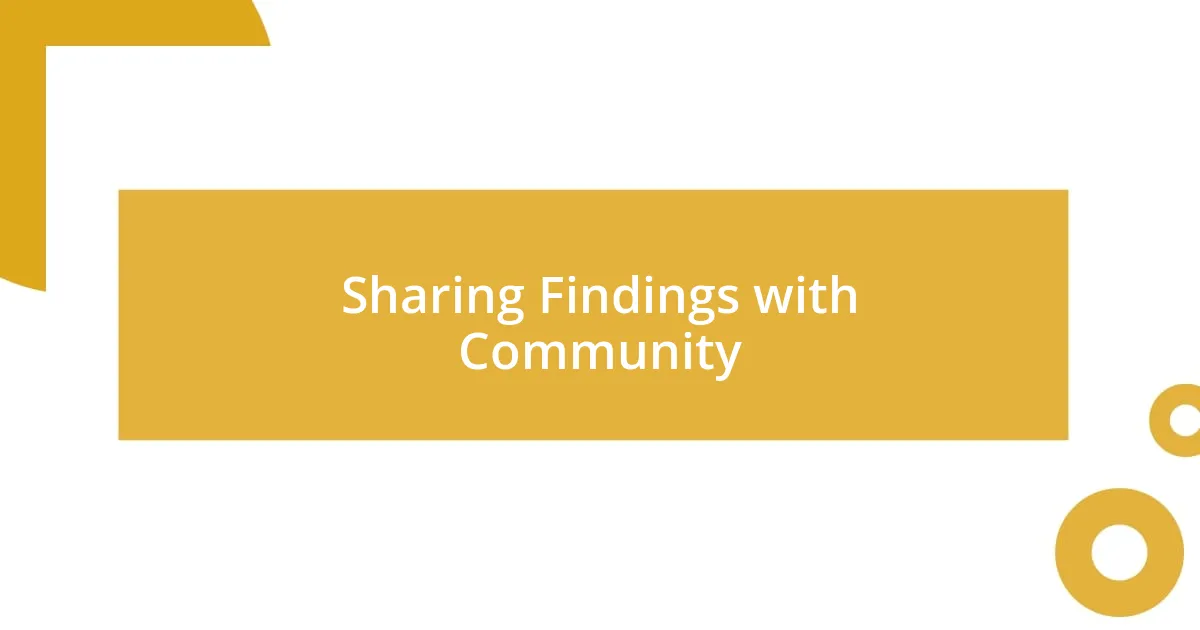
Sharing Findings with Community
Sharing findings with the community has been an exhilarating journey for me. When I first uncovered fascinating tidbits about my heritage, the natural inclination was to share them. I vividly recall organizing a small gathering with close friends and family, where I presented my DNA findings and the cultural connections I had uncovered. Watching their eyes widen with interest and curiosity made me realize that these stories belong not just to me but to all of us; we are woven together through shared histories.
I also took my discoveries online, joining forums and social media groups dedicated to DNA exploration. One evening, I shared a post about my unexpected connection to a region in Eastern Europe. The response was heartwarming—I received messages from people who had similar backgrounds. In those exchanges, I felt a genuine sense of camaraderie and support. Isn’t it amazing how the digital world can unite us based on our shared genetic threads, opening avenues for discussions we wouldn’t otherwise have?
Lastly, I decided to host a community event where individuals could bring their own DNA stories. I was struck by the diversity of experiences—the laughter, the tears, and the lightbulb moments as people uncovered long-held family secrets. One participant revealed a connection to an ancient cultural festival, igniting a passion in others to explore their heritages as well. It hit me then: our journeys are intertwined. When we share our findings, we don’t just celebrate our individual pasts; we inspire others to delve into theirs, fostering a richer community tapestry. How powerful is that?
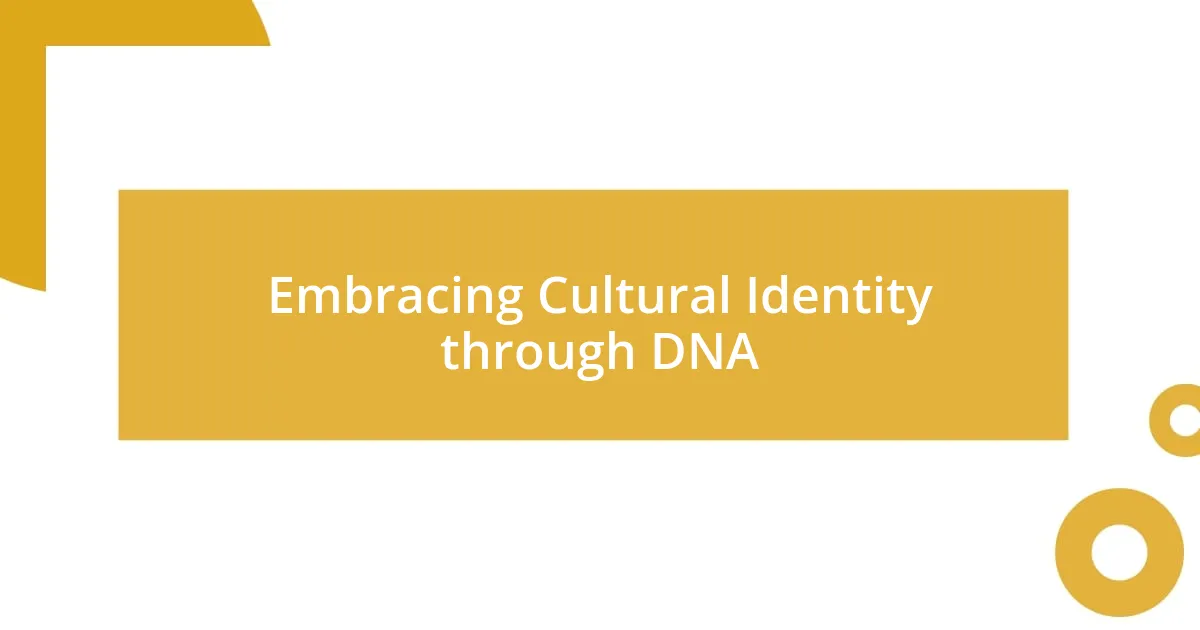
Embracing Cultural Identity through DNA
Embracing my cultural identity through DNA has brought profound clarity to my understanding of who I am. After receiving my results, I distinctly remember the moment it clicked—my genetic markers were like keys unlocking doors to my past. With every percentage point indicating my ancestral origins, I felt an exhilarating rush of connection to cultures I’ve yet to experience firsthand. It’s fascinating how a simple DNA test can ignite such strong feelings of belonging, isn’t it?
What struck me most was discovering the deep roots of my Mediterranean ancestry. While I had always enjoyed Mediterranean cuisine, learning about the cultures tied to my DNA spurred a yearning to immerse myself in those vibrant traditions. I ventured into cooking dishes passed down family lines and even started to learn the language. Each meal wasn’t just about nourishment; it became a celebration of my heritage. Does anyone else find that rediscovering ancestral traditions can be a source of joy and pride?
As I engaged more deeply with my cultural heritage, I also began to understand the role of storytelling in shaping identity. In conversations with family, I found myself digging into stories my grandparents shared—stories that now felt even more palpable with the backdrop of DNA evidence. I asked my grandmother about her childhood rituals, and how her family’s traditions had evolved over generations. Hearing her recount these experiences filled me with hope and excitement. It’s incredible how the threads of our personal stories intertwine with the larger narrative of our cultural heritage, sparking a vibrant sense of identity that exceeds mere genetics. Wouldn’t you agree that our identities are beautifully multi-layered, enriched by both our DNA and the stories we share?
